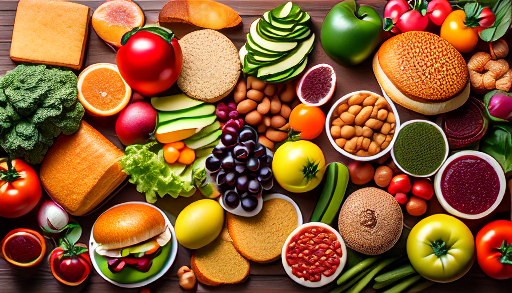That’s just 1½ to 2 cups per day, according to dietary guidelines. Most fruits are incredibly healthy, packed with essential nutrients, and have been shown to boost mood and reduce the risk of chronic diseases like heart disease, obesity, and type 2 diabetes. However, some fruits, despite their natural goodness, can be loaded with hidden sugars, making them less ideal for certain health goals.

In this article, we’ll explore both the “heroes” and “villains” of the fruit world. You’ll learn which fruits to include in your daily diet and which ones to consume in moderation.
The Healthiest Fruits You Should Eat Regularly
1. Blueberries
Blueberries are a powerhouse of antioxidants and nutrients. They are low in calories and have a low glycemic index, making them excellent for blood sugar control. The fiber in blueberries slows the release of glucose into the bloodstream, while their phytonutrients block sugar absorption. Blueberries also support heart health by reducing bad cholesterol and protecting against plaque buildup.
Additionally, they play a role in brain health. Studies suggest that consuming blueberries can protect against oxidative stress and dementia. They’re even included in the MIND diet, which is designed to prevent Alzheimer’s. Whether eaten raw, in smoothies, or as a topping for pancakes, blueberries are a delicious and healthy addition to your diet.
2. Papaya
Papaya is packed with vitamins, especially vitamin C—more than an orange! It also contains vitamin A, potassium, and folate, making it a nutrient-rich option. Papaya’s antioxidants help combat cholesterol buildup in arteries, reducing the risk of heart attack and stroke. Its high fiber content aids digestion and detoxifies the body.
Moreover, papaya contains lutein and zeaxanthin, compounds that protect the eyes from age-related blindness.
3. Grapes
Grapes are one of the oldest cultivated fruits and are brimming with health benefits. Rich in potassium, they help prevent muscle cramps and lower blood pressure. Grapes are also anti-inflammatory and support healthy blood lipids. However, keep them away from dogs as they can be toxic to pets.
4. Pomegranates
They’ve been linked to improved cholesterol levels, reduced blood pressure, and even enhanced cognitive function. Studies show that drinking pomegranate juice daily can improve memory and brain health.
5. Oranges

Oranges are an excellent source of vitamin C and potassium, and their natural sweetness doesn’t lead to sugar cravings. Unlike orange juice, eating a whole orange provides fiber, which supports digestion and regulates blood sugar. With only 69 calories per orange, they’re a great snack for anyone on the go.
6. Apples
The humble apple may not seem glamorous, but it’s full of benefits. Apples contain quercetin, a compound that reduces inflammation and protects against asthma, allergies, and brain cell degeneration. Apples also support heart health by improving cholesterol levels and lowering blood pressure.
For maximum benefits, eat apples with the skin on—it’s rich in flavonoids that fight disease and support weight loss.
7. Raspberries
This makes them an excellent choice for digestive health and weight management. They’re also loaded with antioxidants that protect against cellular damage and cancer. In fact, studies suggest that black raspberry powder can slow the growth of colorectal cancer cells.
8. Avocados
Avocados are often called the most nutritious fruit in the world. They contain over 25 essential nutrients, including vitamins A, B, C, E, and K, as well as potassium, magnesium, and healthy fats. While high in calories, their monounsaturated fats are heart-healthy and support cholesterol management.
Fruits You Should Eat in Moderation
1. Bananas
While bananas are convenient and rich in potassium, they’re also 25% sugar and higher in calories than many fruits.
2. Mangoes
Mangoes are delicious but loaded with sugar—about 26 grams per fruit. They also have a high glycemic index, which rises as the fruit ripens. Enjoy mangoes in moderation, and watch out for them in smoothies where they can quickly add up in sugar content.
3. Dried Fruit
Dried fruits like raisins and apricots are often treated with sugar and chemicals to preserve them. They’re calorie-dense and lose much of their vitamin C during the drying process. If you enjoy dried fruit, opt for homemade versions without added sugar.
4. Coconut
Coconut products, including coconut oil and sugar, are calorie-dense and high in saturated fats. While coconut water is hydrating and healthy, people with high cholesterol or heart disease should limit their intake of other coconut products.
5. Cherries
Cherries are small but pack a sugar punch, with about 17 grams per cup. They can also cause bloating due to compounds that are difficult to digest. Instead, consider a berry mix for a lower-sugar, fiber-rich option.
6. Watermelon
Watermelon is 92% water but contains high levels of fructose. Eating too much can lead to digestive issues and increase blood sugar levels. For some, excessive watermelon intake can cause bloating and leg swelling due to water retention.
7. Lychees
Lychees are high in sugar and can cause blood sugar drops due to toxins they contain, particularly when unripe. For individuals managing diabetes or low blood sugar, it’s best to avoid lychees.
Final Thoughts
Fruits are a cornerstone of a healthy diet, but not all fruits are created equal. While some, like blueberries, papayas, and apples, offer numerous health benefits, others, like bananas, mangoes, and dried fruits, should be eaten in moderation due to their sugar content.
How often do you eat fruits? Is it daily, weekly, or just occasionally? Let us know in the comments below, and don’t forget to share this article with friends and family looking to make healthier choices.
